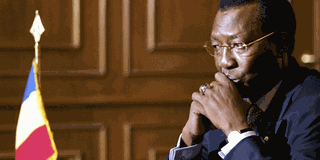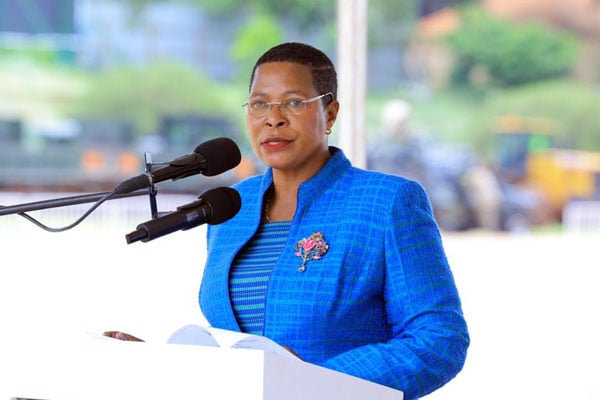Chad leader's death deprives West of key security ally

In this file photo taken on June 30, 2004 Chadian President Idriss Deby answers to reporters in his palace of Njamena. Chad's President Idriss Deby Itno died on April 20, 2021 from wounds sustained in battle after three decades in power, the army announced. PHOTO/AFP
What you need to know:
- The 68-year-old contributed men to a UN peacekeeping force, as well as a regional army known as the G5 Sahel, which is backed heavily by French troops.
The death of Chad's President Idriss Deby Itno has deprived France and the West of a key security ally in the volatile Sahel region where jihadist groups are gaining in strength, analysts say.
His demise -- during a battle with rebels in the north of the country, according to the army -- threatens to bring yet more instability to a turbulent region that is of strategic importance.
Deby, whose undemocratic tactics over 30 years in power were largely overlooked by Western capitals, was viewed as a strongman who was able to deploy battle-hardened troops against jihadist groups around the region.
The 68-year-old contributed men to a UN peacekeeping force, as well as a regional army known as the G5 Sahel, which is backed heavily by French troops.
"Chad is at a critical security crossroads for the whole of the African continent and for many years now has been not just a staunch Western ally but an effective security partner," said Cameron Hudson, a senior fellow and Africa expert at the Atlantic Council think-tank.
"Deby had one of the few armies in Africa that was able to project power outside of their borders," he added.
"It made him the darling of the counter-terrorism community in Africa."
The Sahel -- comprising Burkina Faso, Chad, Mali, Mauritania and Niger -- is a vast semi-arid region that stretches along the southern rim of the Sahara from the Atlantic towards the Red Sea.
Its inhospitable terrain and porous borders have made it an ideal redoubt for armed groups, while its increasingly severe droughts have led to migration to other parts of Africa and Europe.
While the environment and security situation deteriorates, its population is soaring and is projected to double to around 170 million by 2050, according to the United Nations.
In November last year, UN Secretary-General Antonio Guterres called the Sahel a "microcosm of cascading global risks converging in one region."
Almost all neighbouring countries around Deby's landlocked nation are suffering from civil war, jihadist violence or chronic instability.
These include Libya to the north, Niger and Nigeria to the west and southwest, with Sudan, South Sudan and the Central African Republic to the south and east.
"It's an unstable period that is beginning in Chad with possible repercussions for the whole region," Caroline Roussy, an expert at the French Institute for International and Strategic Affairs.
- Projecting firepower -
Deby, a former rebel and career soldier who seized power in a coup in 1990, was long seen in France, the former colonial power, as commanding an army that could be relied on.
French forces have repeatedly come to his rescue to stop rebel advances, most recently in February 2019 when they conducted air strikes on a heavily armed column of pick up trucks heading for the Chadian capital from Libya.

In this file photo taken on November 12, 2019 France's President Emmanuel Macron (R) welcomes Chad's President Idriss Deby as he arrives at the Elysee presidential palace for a lunch as part of the Paris Peace Forum.
The French presidency paid tribute to him as a "courageous friend" and "great soldier" on Monday, while Defence Minister Florence Parly praised Deby as an "essential ally in the fight against terrorism in the Sahel"
Paul Melly, an expert on the Sahel at London-based think-tank Chatham House, said Deby "was willing to send Chadian forces to take on some of the toughest postings, in northern Mali for example."
Chadian troops are garrisoned in neighbouring Niger and they were deployed to Nigeria in 2019 to fight the Boko Haram jihadist group, which has stepped up attacks inside Chad.
Melly questioned whether the military council and Deby's son, who were named to replace the president, would be able to sustain the "strongman system" without the "totemic figure" of Deby at its head.
Richard Moncrieff, Africa specialist at the International Crisis Group think-tank, said Chad was "entering uncharted territory."
"A damaging succession crisis is to be feared, while government forces and rebels have been fighting each other in the north and centre of the country," he said in emailed comments.
The anti-Deby rebels known as the Front for Change and Concord in Chad (FACT), who are armed with weapons procured in war-wracked Libya, have said they intend to march on the capital N'Djamena.
"There's a possibility that we could see a battle on the streets of N'Djamena that could unleash forces that we don't even know yet," said Hudson from the Atlantic Council.





